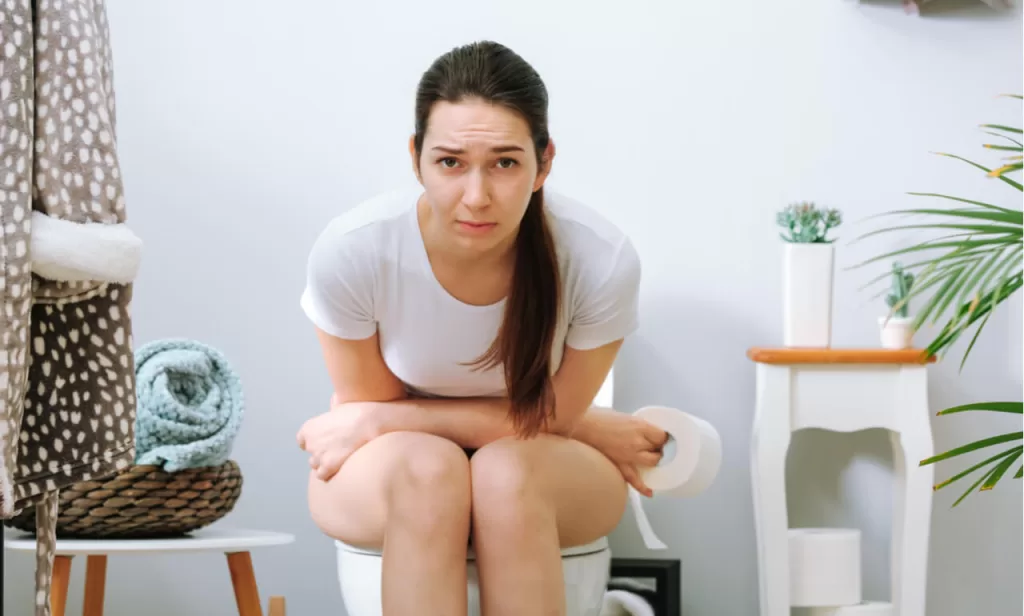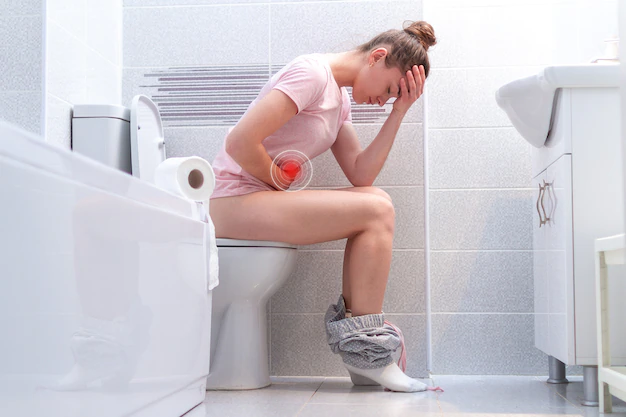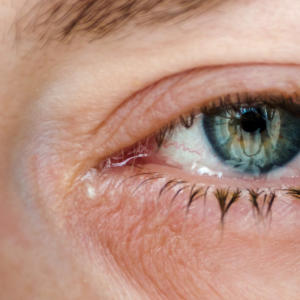Less than three bowel movements each week constitute the criteria for constipation. The frequency of “going” varies greatly from person to person. While some people use the restroom multiple times each day, others only do it once or twice per week. As long as you do not deviate too much from your typical bowel movement pattern, it is natural and unique to you.
Regardless of your bowel habits, one thing is certain: the longer you wait to “go,” the more difficult it will be to pass fecal matter or waste material from the body. Additionally, constipation is frequently characterized by the following:
- Your poop is firm and dry.
- Your bowel movements are painful and difficult to pass.
- You have the feeling that your bowels are still somewhat full.

Why does constipation occur?
Constipation occurs when stools are difficult to pass and bowel movements become infrequent. Most often, it is due to changes in food or routine, insufficient fiber intake, or both. Consult a physician if you experience severe pain, blood in your stools, or constipation that lasts longer than three weeks. Most of the time, constipation is caused by the colon absorbing too much water from stool or feces. This dries out the stool and makes it hard to pass.
In brief, nutrients are typically absorbed as food moves through the digestive tract. The small intestine transports partially digested food waste to the colon, or big intestine. When the colon extracts water from this waste, it becomes a solid known as “stool.” Constipation can slow the passage of food through the digestive system. As a result, the colon is given extra time – too much time — to absorb water from waste. The feces becomes solid, dry, and difficult to remove.
What factors are associated with constipation?
Constipation can be caused by a number of causes, including a person’s lifestyle, medications, health problems, and pregnancy.
Constipation is frequently induced by things such as:
- Meals low in fiber content
- Not getting enough fluids (dehydration).
- Not exercising enough
- Changes to your normal routine, such as traveling, eating, and sleeping at different times.
- Ingesting a great deal of milk or cheese.
- Stress.
- Not yielding to the need to urinate
The following medications may cause constipation:
- Opioids containing codeine, such as oxycodone, hydromorphone, and other powerful painkillers.
- Nonsteroidal anti-inflammatory drugs, such as ibuprofen and, to a lesser degree, neoprene.
- Medications, such as tricyclic antidepressants like amitriptyline (Elavil®) and selective serotonin reuptake inhibitors like fluoxetine.
- Calcium- or aluminum-containing antacids.
- Iron pills or ferric tablets
- To treat allergies, antihistamines such as diphenhydramine (Benadryl®) are utilized.
- Beta-blockers such as atenolol) and calcium channel blockers (such as verapamil, diltiazem, and nifedipine (Procardia®).
- Psychiatric medications include olanzapine and clozapine.
- Anticonvulsants and medications used to treat seizures, such as gabapentin and phenytoin.
- Antiemetic medications, including ondansetron.
Numerous medications frequently cause constipation as a negative effect. If you have any questions or concerns, you should visit your family doctor or community pharmacist.
Constipation can be caused by the following diseases and conditions:
- Hyperglycemia, hypercalcemia, uremia, and an underactive thyroid gland are endocrine illnesses (hypothyroidism).
- Intestine cancer.
- Irritable bowel disorder (IBS).
- Diverticular illness.
- Outlet dysfunction constipation. It is a coordination issue with the pelvic floor muscles. These muscles offer support for the pelvic and abdominal organs. They are essential to facilitate bowel movement.
- Conditions of the nervous system, including multiple sclerosis, stroke, parkinson’s disease, and spinal cord injuries.
- Intestinal laziness. Ineffective colon contraction leads to stool retention.
- Irritability of the intestines.
- Structural issues with the digestive system (like colonic atresia, fistula, volvulus, imperforate anus, intussusception, or malrotation.)
- Multiple-organ diseases, such as scleroderma, lupus, and amyloidosis.
- Pregnancy

What symptoms and indicators imply constipation?
Constipation symptoms include the following:
- You urinate much fewer than three times each week.
- Your stools are dry, hard, and lumpy.
- You experience discomfort or difficulty passing stools.
- You have cramping or a stomachache.
- You suffer nausea and bloating.
- After a bowel movement, you feel as though your system is not completely empty.
There are a variety of all-natural remedies for constipation. Most of them can be performed at home, and research supports the majority of them.
These eleven natural home remedies for constipation may be of assistance.
1. Drink more water
Constipation sufferers should boost their water consumption. Constipation can be caused by chronic dehydration. Hydration and adequate water consumption are essential to avoid this. The consumption of carbonated water (sparkling water) may aid constipation. This can assist them in rehydrating and resuming their activities.
Several studies indicate that crystal-clear water treats constipation more effectively than tap water. This is true for people who have dyspepsia or indigestion, as well as for people who have chronic constipation for no clear reason.
But you shouldn’t drink carbonated drinks, like sweet soda, because they could hurt your health and make constipation worse. Some IBS patients find that carbonated beverages exacerbate their symptoms, so they should avoid sparkling water and other carbonated beverages.
Because dehydration can cause constipation, it is imperative to drink sufficient water. Constipation can be treated more efficiently with pure and clear water.
2. Consider foregoing dairy
Dairy consumption can cause constipation in lactose-intolerant individuals because it impairs intestinal motility. This applies to both adults with lactose intolerance and children with cow’s milk protein intolerance.
If a person suspects they have a dairy intolerance, they can consult their doctor for a diagnosis. The doctor may tell you to temporarily stop eating dairy and eat more calcium-rich foods so that you can see if it helps. The doctor may tell you to temporarily stop eating dairy and eat more calcium-rich foods so that you can see if it helps.
Certain individuals with dairy or lactose sensitivity may have constipation. These individuals can feel better by eliminating dairy from their diets.
3. Boost your consumption of soluble, non-fermentable fiber.
In order to treat constipation, physicians typically recommend that patients take more fiber. This is because increasing your fiber intake will add weight and consistency to your bowel motions, making them easier to pass. Furthermore, it expedites their travel through the digestive tract. In fact, a 2016 study found that adding more fiber to a person’s diet helped 77% of those with persistent constipation.
However, other studies suggest that taking additional fiber may exacerbate the problem. Others say that dietary fiber makes people go to the bathroom more often, but it may not help with other constipation symptoms like pain, bloating, and stools that don’t look right.
This is so that different types of dietary fiber may have varying effects on digestion. There are several types of dietary fibers; however, they can be roughly categorized into two groups: soluble and insoluble fibers.
Vegetables, whole grains, and wheat bran all have insoluble fibers, which add weight to waste and may help it move through the digestive system. Soluble fibers can be found in many fruits and vegetables, as well as in oat bran, barley, nuts, seeds, beans, lentils, and peas. When soluble fibers absorb water, they form a paste that improves and softens the texture of feces.
Psyllium is the most effective non-fermentable soluble fiber for alleviating constipation. Some fermentable soluble fibers may not help with constipation either because when gut bacteria ferment them, they lose their ability to hold water. To avoid constipation, individuals should consume both soluble and insoluble fiber. Each day, men and women should consume a total of 25 grams of fiber.
Consider increasing your consumption of fiber-rich foods. Adding soluble, non-fermentable fiber, such as psyllium, to the diet can also be advantageous.
4. Consume probiotic foods or probiotic pills
Probiotics may aid in the prevention of chronic constipation. Probiotics are naturally occurring, beneficial bacteria found in the gut. Bifidobacteria and Lactobacillus are two examples. It has been found that some people with chronic constipation have an unbalanced population of bacteria. Consuming more probiotic foods may aid in maintaining this equilibrium and preventing constipation.
A 2019 review says that taking probiotics for two weeks helps relieve constipation by making bowel movements more regular. Through the production of short-chain fatty acids, they may also help relieve constipation. These may improve bowel motions, making it simpler to pass feces.
Consider a probiotic supplement instead. Several studies show that after four weeks of taking these supplements, people start to feel the benefits. Try taking probiotic supplements, which are sold online, or eating more probiotic-rich meals to see if this helps with constipation. Prebiotic foods include kimchi, sauerkraut, and yogurt.
Constipation that persists can be treated with probiotics. Consider consuming probiotic foods or taking probiotic supplements.

5. Do more exercise
Numerous studies have revealed that physical activity may help alleviate constipation symptoms. Studies have linked sedentary lifestyles to a higher prevalence of constipation. Consequently, some medical practitioners recommend increasing physical activity to stimulate bowel movements.
However, not all studies support the concept that physical activity might alleviate constipation. Consequently, additional research is required. More research found that exercise didn’t necessarily reduce the number of times a person went to the bathroom, but it did make them feel better overall and ease some symptoms.
Walking at a brisk pace is a modest kind of exercise that can help IBS patients with their digestive issues and their general quality of life. However, jogging can increase symptoms for some individuals. Consider going for regular walks, swimming, cycling, or jogging to see if light exercise is good for you.
In conclusion, for some individuals, exercise helps alleviate constipation issues.
6. Sip coffee, ideally a caffeinated variety.
Coffee may be used to relieve constipation. Some individuals may sense an increased desire to use the restroom after consuming coffee. This is because coffee activates the muscles of the digestive system. A 1998 study found that caffeinated coffee can stimulate the intestines in the same way as a meal. 60% stronger than drinking water and 3% stronger than drinking decaffeinated coffee.
There may also be trace levels of soluble fibers in coffee. These fibers help maintain the balance of microorganisms in the gut and prevent constipation. Those with IBS may experience the bowel-stimulating effects of coffee more severely. In addition, it may exacerbate gastric troubles. Caffeine can be removed from the diet to see if it helps Intestinal Bowel Syndrome.
Coffee helps alleviate constipation by stimulating the intestinal muscles. In addition, trace amounts of soluble fiber may be present.
7. Use senna as a natural laxative.
Senna is a popular, safe herbal laxative that aids in the treatment of constipation. Senna has plant chemicals called glycosides that stimulate neurons in the gut and make you go to the bathroom more often. According to doctors, modest use of senna is safe for adults, but those whose symptoms persist for more than a few days should consult a physician.
Doctors usually don’t give senna to women who are pregnant, breastfeeding, or have certain medical conditions, like inflammatory bowel disease.
Senna, a herbal laxative, is a popular constipation remedy. It stimulates the nerves of the colon to hasten bowel movements.
8. laxatives sold with or without a prescription
A person can talk to a doctor or a pharmacist about which laxative will work best for them. Even though they all work to relieve constipation, different types of laxatives work in different ways. A physician may prescribe one of the following:
Bulking agents are laxatives generated from fiber that increase the stool’s water content.
Stimulant laxatives work by getting the nerves in your digestive tract to fire, which makes you urinate more often.
Oils in stool softeners soften poop and make it easier for it to move through the digestive tract.
Osmotic laxatives soften feces by attracting water from surrounding tissues into the digestive system.
The bottom line is that laxatives are effective in relieving constipation. Inquire with a physician or pharmacist as to which are optimal.
9. Consume prunes.
Prunes are commonly regarded as a laxative. Prunes and prune juice are often suggested as natural ways to treat constipation, and for good reason. Prunes may be the most accessible natural medicine. Prunes may also contain sorbitol in addition to fiber. The impact of this sugar alcohol is diuretic.
Prunes may be more beneficial than fibers such as psyllium. The effective amount may be approximately 50 grams, or seven medium prunes, twice per day. Prunes, on the other hand, may not be the ideal option for individuals with IBS because they are high in carbohydrate-containing foods with sugar and alcohol.
Prunes contain the sugar alcohol sorbitol, which has laxative properties. Prunes are typically an excellent remedy for constipation.
10. Consume shirataki noodles or a supplement containing glucomannan.
The roots of the konjac plant contain glucomannan, a type of soluble fiber. According to a number of studies, it can aid in preventing constipation. As a prebiotic, glucomannan may help balance the good bacteria in the stomach and make it easier to go to the bathroom.
In one trial, including children, glucomannan benefited 45 percent of individuals with severe constipation, while just 13 percent of the control group reported the same benefit. Another investigation that was meticulously done yielded no results of note. In addition to supplements, you can find glucomannan in konjac or shirataki noodles.
In rare instances, glucomannan may be used to alleviate constipation. Shirataki noodles and vitamins are sources of nutrition.
11. Consume prebiotic meals
A fiber made of indigestible carbohydrates is known as prebiotics. Inulin and oligosaccharide are examples of prebiotics. Prebiotic examples include inulin and oligosaccharides. Prebiotics improve digestive health, while dietary fiber alleviates constipation and improves the consistency and amount of feces.
Prebiotic fibers boost digestive health by feeding the good bacteria in the gut, which results in more probiotics and a healthier flora balance in the digestive tract. In fact, certain prebiotics may increase the frequency of bowel movements and soften stool.
These foods are prebiotic:
- Chicory
- chickpeas
- Jerusalem artichokes
- leeks
- garlic
- bananas
- onions
On a low-carb diet, you can’t eat garlic or onions because they can make IBS symptoms worse. Prebiotic meals can improve the balance of gut flora and digestive health. This helps alleviate the problem of constipation.

The final word:
Constipation is uncomfortable and may result from a variety of underlying conditions. Despite this, a number of natural and home remedies are effective.
If constipation doesn’t go away, a patient can talk to their doctor to find out what’s causing it and how to treat it. Despite this, a number of the natural home remedies in this article can be extremely effective at relieving symptoms.
Disclaimer:
This information is for educational purposes only, and no medical advice should be inferred from it. Before changing your diet or adding supplements, please talk to your doctor.
The author’s views are his or her own. The facts and opinions in the article have been taken from various articles and commentaries available in the online media and Eastside Writers does not take any responsibility or obligation for them.
Note: Contact our Writers at www.eastsidewriters.com for writing Blogs/Articles on any niche. We have experts in various domains, from Technology to Finance and from Spirituality to Lifestyle and Entertainment.







Pingback: Amazing Benefits Of Drumsticks Form Treating Respiratory Illness To Lowering Blood Sugar - Eastside Writers
Pingback: Why Do I Have Smelly Farts? Discover the Remedy for Bad Odors.
Pingback: Peeling Back the Truth: The Incredible Health Benefits of Eating Bananas - Eastside Writers
Pingback: The Burden and Agony of Pelvic Floor Pain and Its Path to Relief - Eastside Writers